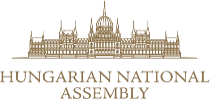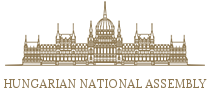Following the accession of Hungary to the European Union on 1 May 2004, relations between the National Assembly and the European Parliament have changed: some functions have undergone fundamental changes or have been completely abolished. The National Assembly is an active participant in the area of interparliamentary cooperation; this applies to its relations with the European Parliament as well, where numerous forms of official cooperation are established. Cooperation between national parliaments and the European Parliament takes place primarily at committee level.
Joint Parliamentary Meetings (JPM)
Joint Parliamentary Meetings, as the name might indicate, are organised jointly by the European Parliament and the national parliament of the country holding the rotating Council Presidency and are usually held in Brussels. Both Members of national parliaments and the European Parliament gather together in order to discuss horizontal topics of common interest. The first JPM was convened in May 2006 to provide a forum for a debate on the future of Europe.
There have been many meetings organised since then, initially two on an annual basis, which has been reduced to one during recent Council Presidencies. One JPM was held during the Hungarian Council Presidency in 2011 on the "Western Balkans – towards a more integrated Europe".
Joint Parliamentary Meetings are co-chaired by the President of the European Parliament and the Speaker of the Presidency Parliament. Meetings are usually attended by the President of the European Commission or the European Commissioner responsible for the policy area on the agenda as well as by the prime minister or other ministers of the country holding the Council Presidency. National parliaments may delegate six members to a JPM. The relevance of JPMs is shrinking compared to other forms of interparliamentary cooperation.
Joint Committee Meetings (JCM)
Joint Committee Meetings are also jointly organised by the European Parliament and the national parliament holding the Council Presidency, but, in contrast to joint parliamentary meetings, JCMs bring together members of parliamentary standing committees so as to discuss current issues tied to a certain policy area. JCMs are presided over by chairpersons of committees of both the European Parliament and the Presidency Parliament and are held in Brussels. More than one JCM may be organised during a six-month Presidency.
Interparliamentary Committee Meetings (ICM)
Interparliamentary Committee Meetings are the most preferred forms of cooperation between the European Parliament and national parliaments. These meetings can provide a platform for national parliaments upon invitation of the European Parliament to express their views on certain legislative proposals. ICMs are organised by the competent standing committee of the European Parliament. The committee responsible for organisational duties is assisted by the Directorate for Relations with National Parliaments at the European Parliament. ICMs are basically ordinary meetings of committees of the European Parliament, where partner committees from national parliaments are invited to take part. Whereas legislative dossiers are discussed jointly, operational tasks and agenda setting remain within the competence of the European Parliamentary committee concerned.
European Parliamentary Week (EPW)
The most recent form in this category is European Parliamentary Week, where Members of the European Parliament discuss progress on economic coordination during the European Semester with their colleagues from national parliaments.
Other, non-thematic meetings
In addition to the above-listed and established multilateral meetings, Members of the European Parliament and national parliaments may seek direct contact with each other. A delegation of Members of the European Parliament may decide to make an official visit to Member States' parliaments and national parliamentarians may on occasion also take part in visits to the European Parliament.
Hungarian Members of the European Parliament
Following Hungary's accession to the European Union, the first European Parliamentary elections in the country were held in June 2004. Thereafter, the 24 newly elected Members of the European Parliament (MEP) exercised their rights as full members in plenary sittings and committee meetings of the European Parliament. The seventh general European elections of 4–7 June 2009 marked the day when citizens of all 27 Member States cast their votes. In Hungary, the polling stations were opened on 7th June 2009. During the 2009–2014 parliamentary term, Hungary had 22 mandates in the European Parliament instead of the previous 24, which according to the Treaty of Lisbon was to be further decreased in all Member States during the eighth parliamentary term of 2014–2019. In the wake of the latest European Parliamentary elections of 22–25 May 2014, Hungarian MEPs held 21 seats in the European Parliament.
Relations between the Hungarian National Assembly and Hungarian Members of the European Parliament
With the legal basis provided by Act LVII of 2004 on the Legal Status of Hungarian Members of the European Parliament, the National Assembly maintains relations with Hungarian Members of the European Parliament, who are thus entitled to special rights enabling them to participate in the work of the National Assembly. The EU Department of the Directorate for Foreign Relations of the National Assembly is responsible for maintaining day-to-day contact with MEPs, who are thus informed regularly on plenary sittings as well as on meetings of standing committees. Hungarian MEPs may take part in the meetings of all standing committees, and they also have the option to take the floor. They may also exercise the same rights in plenary sittings when affairs related to the European Union are being discussed. While Hungarian MEPs enjoy a fairly wide range of powers by European standards, they rarely avail themselves of them in practice. They usually take the floor in debates on draft legislative proposals on the state budget, in policy debates on European affairs and in debates on the ratification of a new Member State's Accession Treaty. MEPs seldom attend committee meetings other than meetings of the Committee on European Affairs.
Legal basis
Legislation on the election and legal status of Hungarian Members of the European Parliament:
- The Fundamental Law of Hungary of 25 April 2011.
- Act CXIII of 2003 on the Election of Hungarian Members of the European Parliament
- Act LVII of 2004 on the Legal Status of Hungarian Members of the European Parliament
- Parliamentary Resolution 10/2014 (24 Feb. 2014) on Certain Provisions of the Rules of Procedure




